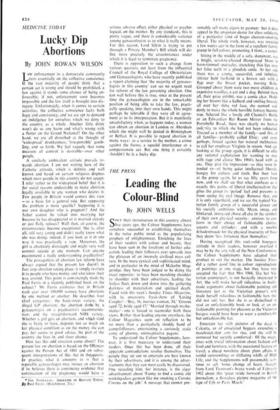Lucky Dip Abortions
By JOHN ROWAN WILSON
ZAy/ enforcement in a democratic community rests essentially on the collective conscience. If the vast majority of people think that a certain act is wrong and should be prohibited, a law against it stands some chance of being en- forceable; if not, enforcement soon becomes impossible and the law itself is brought into dis- repute. Unfortunately, when it comes to certain activities, the collective conscience lacks both logic and consistency, and we are apt to demand an indulgence for ourselves which we deny to the country as a whole. Another little drink won't do us any harm and what's wrong with a flutter on the Grand National? On the other hand, we are all disturbed at the thought of 'widespread' drunkenness, 'irresponsible' gamb- ling, and so forth. We feel vaguely that some measure of control is desirable—over other people.
A similarly ambivalent attitude prevails to- wards abortion. I am not writing here of the Catholic attitude, which is definite and well known and based on certain religious clogmas which most people in this country do not accept. I refer rather to the widespread belief that it is for social reasons undesirable to make abortion legally available to any woman who desires it. Few people in Britain would contest this view —as a basis for a general rule. But supposing the problem is more specific? Supposing it is our own daughter who is pregnant? And the father cannot be talked into marrying her because he has disappeared or is married already or just flatly refuses? Well then, of course, the circumstances become exceptional. She is, after all, still very young and didn't really know what she was doing; indeed, if you look at it in one way it was practically a tape. Moreover, the girl is absolutely distraught and might very well commit suicide at any moment. Can anyone recommend a really understanding psychiatrist?
The protagonists of abortion law reform have always argued that the present law doesn't in fact stop abortion taking place; it simply restricts It to people who have money and who know their way around. This point is convincingly made by Paul Ferris in a recently published book on the subject.* Mr Ferris estimates that in Britain each year over 100,000 women have abortions by one method or another. He describes four chief categories: the back-street variety; the illegal GP abortion; the abortion dorto. by a. gynaecologist on a psychiatrist's recommenda- tion; and the straightforward NHS variety. Whether a girl gets an abortion, and which kind she is likely to have, depends not so much on her physical condition as on the money she can pay, her access to good advice, the part of the country she lives in, and sheer chance.
How has this odd situation come about? The present law on abortion is based on the Offences against the Person Act of 1861 and on subse- quent interpretations of this Act in theonourts. In practice, what it amounts to is' that a reputable gynaecologist may induce an abortion if he believes there is convincing evidence that continuation of the pregnancy would have a • THE NAMELESS: ABORTION IN BRITAII*, TODAY.
jBy Paul Ferris. (Hutchinson. 21s.1 serious adverse effect, either physical or psycho- logical, on the mother. By any standards, this is pretty vague, and there is considerable variance among gynaecologists as to what it really means. For this reason, Lord Silkin is trying to put through a Private Member's Bill which will de- fine more precisely the circumstances under which it is legal to terminate pregnancy.
There is opposition to such a change from various quarters, not least from the influential Council of the Royal College of Obstetricians and Gynaecologists, who have recently published a report claiming that 'the majority of gynaeco- logists in this country' can see no urgent need for reform of the law governing abortion. One can well believe this is true, since at the present time the gynaecologists are in the remarkable position of being able to take the law, practi- cally speaking, into their own hands. This might perhaps be tolerable if they were all in agree- ment as to its interpretation. But it is manifestly unsatisfactory when, as happens today, a woman can obtain an abortion in London or Aberdeen which she might well be denied in Birmingham or Belfast. It is possible -to regard abortion in many ways: as a service to the mother, a crime against the foetus, a squalid interference or a compassionate act. But one thing it certainly shouldn't be is a lucky dip.


































 Previous page
Previous page